PARKER'S
RETREAT
I am writing this for my children so that some day they may read it
and remember their father. It is an adventure story of sorts, and it
has had a great effect on me.
After graduating from infantry Officer's Candidate School at Fort
Benning, Georgia, as a second lieutenant, on June 20, 1944, and
getting married three days later, I reported to the 106th Infantry
Division at Camp Atterbury, Indiana on
July 1. This division had been one of the better units in the United
States but had been stripped of all but a cadre of officers and
noncoms in order to provide replacements for the Normandy landings.
Some 10 of us from my OCS class were sent to it as part of the
process of building it back up to strength.
Morale in the division was not very good. There were good many jokes
about our being readied for Military Police duty in Germany or some
other noncombatant role. The jokes were based on the fact that we
were receiving a wild assortment of replacements, many of whom were
not fit either by training or description for combat. Thus, I was
given the first platoon of the antitank company of the 422nd
infantry and discovered that of my platoon, less than a third had
had infantry basic training. One private was a carpenter who had
spent the war making training aids and had risen to the rank of
sergeant in the process. He had suddenly been plucked out of his job
and put into the infantry, and had been demoted in the process. I
never knew why; but his morale was as one would have imagined, and
he knew nothing about the infantry. Another private had been a
pastry cook in some military establishment until a month earlier,
when he, too, had been drafted into the 106th. This story could be
repeated over and over again through the Division. Fortunately, our
noncoms were good, and we received an infusion of new infantry
replacement training center graduates just before we sailed in
October. Overall, the Division was not very effective, however.
Before going overseas, we were inspected by General Ben Lear, he of
YooHoo fame. Our division commander general, Alan W. Jones, was
reported to be anxious to get his unit overseas and get it into
action, and there was a certain amount of fudging about our
readiness. Two small incidents indicate the atmosphere. First, one
of my colleagues was given the job of testing units from another
regiment on night patrolling. The first unit he tested
performed abysmally and he gave it a failing grade, He was called to
Division Headquarters and told to change the grade to show that the
unit had passed. Second, we had in my platoon a .50 caliber machine
gun that had long since fired more than enough rounds to be labeled
class X and replaced. We tried in vain to get it replaced before
leaving Atterbury, but were told there wasn't time, and went into
combat with it. It fired perhaps a dozen rounds on the morning of
December 16 and then broke down irreparably.
In any event, we sailed from Boston on the Aquitania on October 12,
landed at Glasgow ten days later and moved into a bivouac at
Fairford in Gloucestershire. It was cold and damp, but we had rather
a good time for about six weeks until we were taken to Southampton
and put on little channel steamers (I had to stand up at the top of
the companionway and literally kick my men through the door to their
compartment, it was so narrow) and taken across to Le Havre. We
spent ten days in the mud and rain on a hillside near Le Havre and
then moved off across France in motorized column. On December 10 we
replaced the 2nd Infantry Division along a 27-mile line, just over
the border from Belgium into Germany.
The 422nd had as part of its sector
the Schnee Eifel ridge which runs roughly northeast to southwest to
Bleialf.
This had been a quiet sector and we were apparently being moved into
the line at this spot to give us a gradual introduction to combat
while the Second Division moved out for an attack to the south. The
422nd relieved the 9th Infantry and I inherited a very cozy position
in the village of Schlausenbach, where I had the task of defending
the regimental headquarters against tank attack. I had two 57 mm
guns in position on the northeastern side of the 'village covering
the approaches from Kobscheid and Auw. Our field of fire was
admirable and we had just enough defilade to protect us very
effectively against flat trajectory fire. The gun on the left was
commanded by Sergeant Michael Valovcin of Bridgeport, Connecticut,
and that on the right by Sergeant William Chappell) of Chicago. A
third gun, under Sergeant Arthur Wiegert of Overland, Missouri, was
detached from the platoon and set up near one of the Siegfried Line
bunkers in the Schnee Eifel, near the elevation known as Schawarzer
Mann.
My platoon sergeant (John Harrell of Bainbridge, Georgia) and driver
(Albert Kath of Janesville, Wisconsin) set up housekeeping in a
little farmhouse on the very edge of the village, about 50 yards in
front of our guns. We soon worked out a comfortable routine and
looked forward to Christmas.
We were subsequently caught in
the German offensive of December 16, which became known as the
Battle of the Bulge. The Bulge was the salient in the American line
of which we were the northern flank. The 106th was pretty well
eliminated from the fight. Of its nine infantry battalions, three
survived intact. Most of the rest of the Division was captured.
The following is from an account I wrote the following Spring.
On the morning of the 16th of December, I pulled the three o'clock
guard shift in our little farmhouse. I started a new pot of coffee
and began a letter to Jeanne. After a little time had passed, the
customary early morning barrage started, the artillery positions
were just about a mile behind me, and by nature of the terrain, the
shells came fairly low over the house. I could hear the very
encouraging sound of outgoing mail and was happily thinking about
the poor Germans who were getting killed with precision and finesse.
Finally, it seemed to me that the sound changed just a trifle, the
shells sounded different.
After fifteen minutes or so, I
realized that this was incoming freight, the Germans were shooting
back at us. And we all knew they didn't have any artillery left. I
expected the firing to die down, believing it to be merely
interdictory, but instead it increased in intensity and soon shells
were falling all over my little bailiwick. I took a look outside and
saw the town of Kopfscheid, a mile to my left, a mass of flames and
tracers, apparently a very strong patrol action. I knew that there
was a troop of the 14th cavalry in that town and being very fond of
the cavalry, figured that they would soon dispense with the
nuisance. Finally, when dawn came, I went down to my gun positions
to inspect them and see how the men were getting along under fire. I
was amazed to find that three shells, all of them duds, had landed
within twenty yards of one position. The men were down in their
holes, looking green around the gills. At the company CP we
discussed the matter and decided it was very good battle
indoctrination.
About 8 a. m. we found that a general attack had broken out along
the entire front and that there were Germans running around all over
the place, which was disturbing, to say the least. Later in the
morning, we found that we were cut off from Division and that our
artillery was no more. Also, we had very little food, water and
ammunition. That afternoon I had a very exciting fire duel with a
couple of Tiger tanks at the very extreme range of 1700 yards. My
gunners couldn't hit a thing, but neither could the Germans, and
everybody was quite exhilarated. That night a platoon of Tank
Destroyers came into Schiausenbach to help and it was very
encouraging, because I was beginning to think that if any tanks ever
attacked our positions, we wouldn't have much luck.
We strengthened our positions
and prepared for the worst. On the morning of the 18th, we suddenly
pulled stakes and made for the woods. Our rifle battalions were
attempting to attack back towards St. Vith, and we were to follow
them up if they made a breakthrough. They walked into a terrific
nest of 88s, MG 42s, mortars, tanks. and every thing else
imaginable. We began to consider the situation desperate. Up until
that time we hadn't worried a good deal as we had heard the Ninth
Armored was to make a breakthrough, that ammunition and supplies
would be dropped to us, and that Patton was on his way. Blissful
ignorance. When the rifle battalions were very effectively stopped,
the motor elements, with which my platoon and I were riding,
attempted to make a run for it and find some gap in the German
lines. We tore through one town and up a hill only to run into a
group of tanks which stopped us momentarily; then we turned and went
down the road. By some chance my company commander, Captain
Edward Vitz, was in the lead jeep and I was right behind him. As he
topped a hill, he ran over a mine and the jeep flew into the air,
bodies hurtling in several directions, and stray bits of equipment
littering the landscape. That stopped the whole column.
They were hopelessly snarled up
by that time and we knew we didn't have time to clear any mine
field. I ran up to the jeep and we found everyone alive; the first
sergeant and our radio operator were pretty badly hurt, but everyone
else was doing fairly well. We began administering first aid and
waited for developments. About that time the captain who was in
command of the column came up and informed us that we had just
surrendered, which didn't impress us very much as we were going to
run for the woods when night came and that was not far off. However,
when we thought about the fact that we could see Germans all over
the place and that we didn't have any idea where our lines were, we
had no rations, most of us had sore feet, and the forests looked
most inhospitable, we changed our mind, which was probably just as
well. Although I will always wonder what would have happened and if
I just lacked the guts to try.
About night fall we loaded the wounded on some trucks and took them
to a German field hospital; most of them were delirious and I felt
very bad about leaving them, especially two of the boys from my
platoon who had been shot in the leg. That night I slept on the
ground in an enclosure with about 500 prisoners and succeeded in
doing a bang-up job of freezing my feet.
The next day was the 20th, and we were a sad looking sight as we
marched out on the road in column of fives and started toward
Germany. That day we marched for 32 miles, through Priam and other
towns I cannot remember. We got no food or water but thought the
sugar beets we occasionally found on the road most delicious. Water
we drank from the ditches. And I thanked God many a time that the
United States Army gives you so many shots. Otherwise we all would
have contracted something. We reached the town of Gerolstein at 2
a.m. on the 21st - tired, hungry, and frozen. Here I ran into
Johnson, Prell, and Shapley from my company, also my entire platoon
less the wounded, and a number of other officers from the regiment.
Prell had attempted to escape but he ran full tilt into a German
tent and was recaptured. We slept on the ground for a few hours,
Shapley, Kastenbaum and I sharing my blanket. I slept soundly. At
daybreak, Johnson and Juster (cannon company) convinced me I should
go up to a nearby German aid station and get my feet treated, so
Juster lead me up to the place, pushed me into a compound and told
me to turn right. I took about three steps, when a Hauptmann came up
to me, grabbed me and pushed me in another column. I found myself
alongside Lt,. Howard Alexander, our Exec, and six other officers of
the regiment. I asked what was going on and they said, "We're going
to the train." Then the guards came along and handed us some
crackers and cheese and marched us off through the town to the
bahnhof. Here we loaded on 40 & 8 box cars full
1of manure and pulled out for
parts unknown. This was one of the last trains to leave Gerolatein,
and if I hadn't gone to get my feet fixed, I never would have made
it. Lady Luck had smiled again. After a day or two we came to
Limburg, site of a large transient camp. Here we waited until the
26th before pulling out, receiving very little to eat, and spent a
most unhappy Christmas.
On the evening of the 23rd, the RAF came over to bomb the industrial
and rail facilities at Limburg, and they succeeded in giving us a
very bad night. One bomb fell on a barracks full of American
officers at the camp and killed some 67 officers. Jack Kilkenny, who
was an usher at my wedding, was among these. We had about forty
casualties on the train; several of the cars broke open and the men
rushed out into an open field running for an air raid shelter, a
bomb lit in the field and caused a number of deaths and a larger
number of wounded. I found a hole near the train and dived into it,
finding myself on top of an American and a German soldier.
Nationality didn't seem to make much difference.
We left Limburg on the 26th with great rejoicing; we were actually
looking forward to a permanent camp. We crept through Germany for
five days, stopping frequently and always moving slowly. I might add
at this point that it is extremely uncomfortable not to be able to
lie down for nine days. Once during this leg of the journey I got
about half a cup of hot soup,2
I was almost sick from eating so much. But the greatest hardship of
the journey was not the physical but the mental - it was like
staring at a blank wall for a short eternity; when you're starving
and cold, your mind doesn't function properly and you can't keep
your mind on anything but food; I could always see a plate of
scrambled eggs and pancakes floating before my eyes and it eclipsed
all other mental activities. And constant preoccupation with
physical hardships reduces you to a kin4 of agonizing lethargy.
On the 30th of December we arrived at Stalag IV B, Muehlberg. We
stood in the open for three hours before finally entering the
delousing chamber, but it was worth it - for here we had the most
wonderfully hot shower of our lives. It was so hot that we all felt
faint and light-headed upon emerging from it. I was so dirty the
Germans sent me back three times before they'd let me get dressed,
each time it got better.
After the delousing we were processed and taken to a barracks. There
was no American compound at IV B so we were taken in by RAF
non-coms. They had hot tea and soup waiting for us, and water to
shave in. Those boys were wonderful to us. They gave up their own
beds, their food, and their cigarettes (which were as good as gold).
It was almost amusing to find that I was in a barracks with my
platoon. How that group managed to stick together I don't know, but
it certainly was good to see them, even if they were ragged and
haggard. I'll never see a nicer, more cooperative platoon.
The English had been prisoners for up to five and a half years and
they had prison life down to a perfect routine. There was no
quarreling and everyone helped his neighbor. We greatly admired
their system and decided that Americans could never do as well. We
were astounded to see beautiful cakes all over the place - I mean
cakes like you find in a bakery. By many devious methods they had
obtained flour and sugar, and using powdered milk and jam from their
Red Cross packages had baked some masterpieces. It seems that this
was an annual occurrence, that every Christmas and New Years they
had a big blow-out. New Years eve they had a show, which we
attended. There was one female impersonator who was so realistic
that we almost fell out of our seats. And the show itself was far
better than any USO show I've ever seen.
We stayed in the IVB ten days, receiving one Red Cross package
(English) per two men. These packages were our life blood. They
contained powdered milk, chocolate, cigarettes, coffee (soluble) or
tea, biscuits, jam, processed meats, cheese, salmon or sardines,
primes or raisins, and sugar. Each box contained ten pounds of food.
They usually came every two weeks at most camps, sometimes they came
once a week.
While at IVB some more of the regiment came in. I met Jim Hesse,
from Wichita, who was an. old friend of some of my fraternity
brothers and he and I became informal "muckers", the English
equivalent of partner.
We left Muehlberg on January 8 for Of lag 64, a camp for American
officers at Szubin, Poland. That trip was fraught with trials, We
occupied half of each box car and the guards occupied the other
half. There was a barbed wire fence between us. When we had a "rest
stop", we either had to climb over the fence to the guard's door or
have them get out and open the door on our side.
I was the only German speaker in the car and a number of the
officers had violent diarrhea, which meant that every hour or so,
night and day, I would have to tell the guards that someone had to
go (including myself). Hesse was pretty sick and I will never forget
the night we went through Frankfort am der Oder, the train wasn't
stopping and Hesse had to climb over the fence, open the guard's
door, and with a guard holding on to each hand, shove his rear out
the door and into the wintry blast. It was funny even then.
We arrived at Oflag 64 on the 10th of January. I found that Colonel
Goode, who lived across the street at Ft. Leavenworth, was the
senior American officer, that each man got a parcel a week, that
cigarettes were plentiful and that it was colder than hell. Hesse
and I moved into a cubicle with 6 other officers. One a high school
classmate of my brother's, and another a good friend of Hesse's. I
got a wool undershirt and two blankets, got a copy of Gibbon's
"Decline and Fall" from the camp library, crawled into my sack and
stayed there, except that I contracted diarrhea myself and was
constantly running to and from the latrine, living in constant fear
of an indiscreet accident. I couldn't eat potatoes or bread, the
staples of our diet, and I was living on cheese and toast, trading
my other foods for cheese. I did make one chocolate pudding and it
was the most delicious chocolate pudding I've ever eaten anywhere at
at any time. We spent a good part of our time cooking exotic dishes
from our meager materials, and the goodies that were turned out of
things like biscuits, D-rations, and the never-failing powdered milk
would surprise many a chef. We all swore that upon our return we
would take our wives into the kitchen and show them how to cook on a
tin can using cardboard for fuel and next to nothing for materials.
But always I could see and taste scrambled eggs. Never did I want
anything worse.
When the Russian drive commenced, we all speculated on what the
future held for us. That the Germans would evacuate us we didn't
doubt for a minute, but as each day came and the Russians drew
nearer, we saw no signs of our impending departure other than a
constant stream of refugees pouring down the roads in wagons,
trucks, cars, carriages and on. foot. Finally, on the morning of the
20th, we were told to be prepared to move at any time. Frenzied
action followed, all sorts of costumes were assembled, people sewed
pockets all over their clothes, made little sledges and packs to
carry their belongings, rolled up their blankets, and dressed for
the cold march to come. I put on two suits of wool underwear, two
pair of wool socks, two sets of wool OD's, two sweaters, a field
jacket, and my trusty field coat, a wool knit cap and a towel for a
scarf completed the ensemble.3
Then came a flurry of eating - "bashing" was the term employed at
the Oflag to describe any consumption of food beyond the normal
routine amount. And bashing passed all bounds that night. We were
issued a new parcel and I knew that one was all I could carry in my
condition. So I finished the half a parcel left from the last issue.
I made a wonderful pudding, and ate one whole box of raisins
straight. It was wonderful but it didn't help my diarrhea. All of
the cigarettes we had stored were brought out, and there was a mess
of them. Many of the officers had received tobacco parcels from home
and we had cigarettes to burn. I had three cartons.
The next morning we marched out in the cold air and after much
preliminary stalling around started down the road, leaving about 50
or 75 sick under Colonel Fred Drury at the hospital. That march
clarified the term "rat-race" for me. There were approximately
twelve or fourteen hundred officers and they were spread out for
five miles. Everyone was carrying everything he owned, and as this
or that got too heavy, he dropped it along the way. There were
cigarettes and cigars, pipe tobacco, books, food, blankets, clothes,
and officers littering the road for miles. It was a mess. After some
16 kilo-meters of very painful trudging, we pulled into a large
Polish estate and were herded into the cow barns. Some of the men
complained of the smell and rather liberal distribution of dung, but
it was the first time I'd been warm in a month. We could get milk
from the cows, and I thought the smell was wonderful.
In the morning we were quite startled to learn that all of us too
sick to march would be left behind. Hease and I were both in
misery as a result of our bowels and feet - we didn't march. There
were about 200 of us who didn't. We moved into the mansion of the
place and bedded down on the floor, waiting for we didn't know what.
About 1030 that night, (or the following), a Sherman tank came down
the road with a Russian driver. It was cause for no little
celebration. Except that I was too sick and tired to care about
anything and I didn't get up to see the Russian. Besides, some of us
continued to think that he'd probably fail to recognize us and start
throwing a little weight around. But finally we decided we were
free. So what?
The Russians told us to wait and they would bring trucks to take us
to Moscow where we would eat from platinum plates held by Molotov
and Stalin, or so the general impression was. Three weeks later we
were still eating bread and soup and no trucks. For which I do not
blame the Russians; they were too busy fighting a war to release
invaluable trucks for a load of prisoners. Finally, growing weary of
inaction, Hesse and I and a Polish-speaking boy from Detroit named
Sito took off for Warsaw. I might add that there were only about
forty of the original 200 left by this time. And what with missing a
train and a number of other things, we even got behind the fort]
remaining.
The farm we had been at was
called "Wekheim" and was five kilo-meters from the town of Erin. In
Frill we stayed in a hotel and slept in beds. That was the first
night, the night we missed the train. The next night we slept in the
railroad station. And the following night we slept above a creamery
across the street from the station. The man who owned the creamery
and his family occupied a very nice apartment that must have cost a
pot full of dough. We actually had tub baths and the water was hot.
Also, we sat on a genuine white porcelain flush toilet. I don't know
which felt better, the tub or the toilet.
About 4 a.m. the following day, a train pulled into Exin and the
stationmaster came over as was prearranged, jerked us out of our
warm beds and placed us on the coal car in the rear of the engine.
We soon got tired of the cold and worked out way up to stand behind
the firebox and that with the engineer. Here it might be time to say
that in Poland at the time oft this story, and still
4 for all I know, there were no
scheduled trains, nor any passenger trains such as we know in this
country. You might wait fifteen minutes and then you might wait two
weeks for one to come. They were usually always ammunition or supply
trains returning from or going to the front. No coaches were
provided and all accommodations were a' la box car or, if you were
less fortunate, a flat or oil car. I have seen a flat car covered to
overflowing with refugees taking off on a five-day trip in the dead
of winter. Long exposure to such conditions has apparently hardened
the Polish peasant. Everywhere you saw refugees, babies, girls,
young men, old men, old ladies. It was not at all uncommon to see a
70 year old woman trudging down the road with a fifty or sixty pound
load on her back. I will never forget the time one old grandmother
asked one of the officers (six feet tall, 170 pounds) to lift her
load up on her back. He couldn't even budge it. She grunted in
disgust, threw it on her shoulder and walked off. Of course, the
officer was in a weakened condition, but she didn't know it.
Later in the morning we arrived at the oldest city in Poland, Gnesen
(Gniesno) Here we met the first group of American GIs.
They had been at Stalag III-C near Kustrin and were heading for
Warsaw also. At this time rumors were floating all over the place to
the effect there was an American Consul in Warsaw, Lublin, Odessa,
and every other locality you visited. The Poles were telling us
stories of American planes landing near Warsaw and carrying away our
comrades who preceded us. Then we met some French prisoners and they
had heard the same story over Radio Switzerland. No latrine ever
boasted more gossip. We hopped some open box cars in Gnieznoand rode
for a few hours to Wrzesnia where we asked about trains to Warsaw.
As always we got the same answer: "It's not definite, maybe an hour,
maybe a week." Well, what with missing about five or six trains, we
stayed two days in Wrzesnia. We probably wouldn't have gotten out
when we did had I not noticed that the French-men were suddenly
moving (without telling anybody - so they could get a good box car
with straw and maybe a stove) and we followed right behind them,
even to the extent of riding the same car. We were trying to avoid
an English speaking Pole, who had been a member of the Polish
underground and said he had assassinated some Gestapo leaders,
because he was hinting broadly about us smuggling him out of the
country. Which was all well and good, but for all we knew, he was a
Gestapo agent himself. I've forgotten how long that ride to Warsaw
lasted. I know I did enjoy it because the Frenchman found a stove
for the car and seemed to have a genius for finding fuel. Also, they
had candles and were all in all quite sociable. One of them even
told me I spoke German without an accent.
When we arrived in Warsaw on
February 22, we found nothing but devastation. The entire city was
demolished. It was actually frightening; you could tell that it once
was beautiful, but it was certainly a mass of wreckage then. We
walked across the Vistula on a temporary bridge and were then in
Praga, a suburb of Warsaw that was in fairly good condition. After a
few hours walking around we found the Polish Red Cross building and
got some soup. They told us that we were supposed to go on to Lublin,
but we also heard that the Russians were putting all escaped
prisoners in a camp there (Mydanek?) where all the Jews were
cremated by the Germans. We also found that they were collecting all
prisoners in Praga and sending them to the former Polish West Point
at Rembertow, about four or five miles out.
We didn't particular care to enter either of these establishments as
the food was practically the same as our prison rations and they
weren't too clean. We spent the first night at the Red Cross. Three
GIs came in with a sack full of sausage, cakes and doughnuts (which
our mouths had watered over as we passed them in shop windows but
which we were unable to buy as we had no zlotys (two cents American
money,, and each doughnut cost twenty-five zlotys) that they had
purchased with the proceeds of selling the bicycles they rode from
Germany. They got nine thousand zlotys for three bikes and they had
eaten up six thousand of them that day. But they were happy as hell.
I ate one of the doughnuts and it was delicious. Hesse and I swore
we'd get some of those or die trying; we never got them; we didn't
die either.
A little later a man came in and started trading for clothes, a GI
shirt was worth six hundred zlotys. He spoke English, so I went up
to ask him if he was trading for Belgian francs, of which I had five
thousand. He turned out to be an American who had been living in
France and was taken by the Gestapo. He was some sort of a
millionaire, or so he claimed, and after a little discussion, he
wanted me to go in business with him and open an American bar. We
were to work up capital by buying and selling the English pounds and
American dollars the GIs were bringing in to Warsaw, those two
moneys being the only ones that always had a ready market. I was
sorely tempted and would have liked very much to have gone into
business with him as he was a pretty sharp customer. He had come to
Praga with only his clothes and not a word of Polish, and by trading
had worked a coat up to three thousand zlotys and an apartment.
I was still debating about three days later when we were staying
with
a Polish moonshiner on the outskirts of the city. He was making a
sort of white lightening out of rye. It was really pretty good but a
trifle on the potent side, especially at the rate they drank it. We
had a merry time in that house, plenty to eat and drink, and a good
bed to sleep on. My mind was made up for me very rapidly when Hesse
took an inspection trip out to Rembertow and came back in a hurry
with the news that the Russians had made up a train there and were
preparing to load all the Americans and English in an hour or so and
take off for Odessa where we would catch a ship. We hurriedly
grabbed our belongings, ate a meal, and said goodbye to our hosts.
We got to Rembertow in the nick of time, four or five coming in
right on our tails, and loaded on the train. The accommodations were
a little crowded, but we didn't give a damn because we were going
home. It took us a week to get to Odessa. Along the way I traded off
my socks for two loaves of delicious bread. We also got some
supplies taken from a captured German warehouse. All in all, it was
a pretty good trip, the stove was hot all the time, and we got two
hot meals a day (cabbage soup and a sort of thick barley or rice
stew).
We arrived in Odessa about the first of March and moved into a
couple of abandoned mansions. The boys who had gone to Lublin were
there ahead of us and we had a sort of reunion. Also, a Major
General (Dean) from the Moscow military commission was there to meet
us and had American cigarettes, corned beef, chocolate bars, life
savers, preserved butter, and all sorts of various goodies. We were
just starting to eat again when an English boat came in with a load
of Russian prisoners. The suspense was terrible, but we finally
loaded after being in Odessa a week. When we hit the dining room on
the ship we would sit and eat white bread until we thought we'd
burst. It was our first real white bread and it tasted like cake. It
was wonderful. About a week later we pulled into Port Said, stayed
there a week enjoying the sights and the food. Then we traveled to
Naples, spent a week there, loaded on another boat and came home. We
all got 60 days leave and we were all happy to be back.
FINIS
1
An obvious exaggeration. The cars had recently been used to
transport horses, however.
2
in the Stuttgard Banhof.
3 I
weighed 134 pounds with all these clothes on, according to the
dispensary scales.
4
i.e., in June 1945.
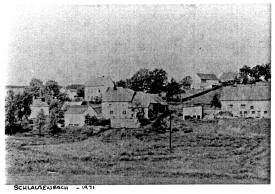
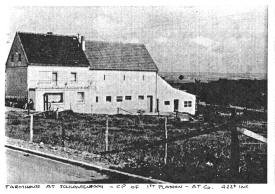
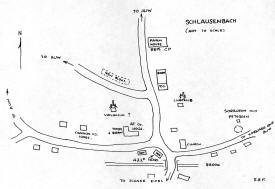
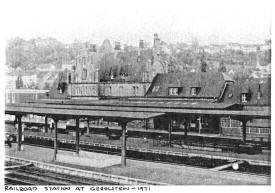
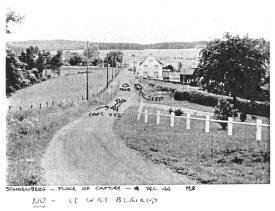
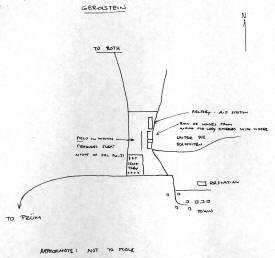
Submitted by
Richard Parker |





